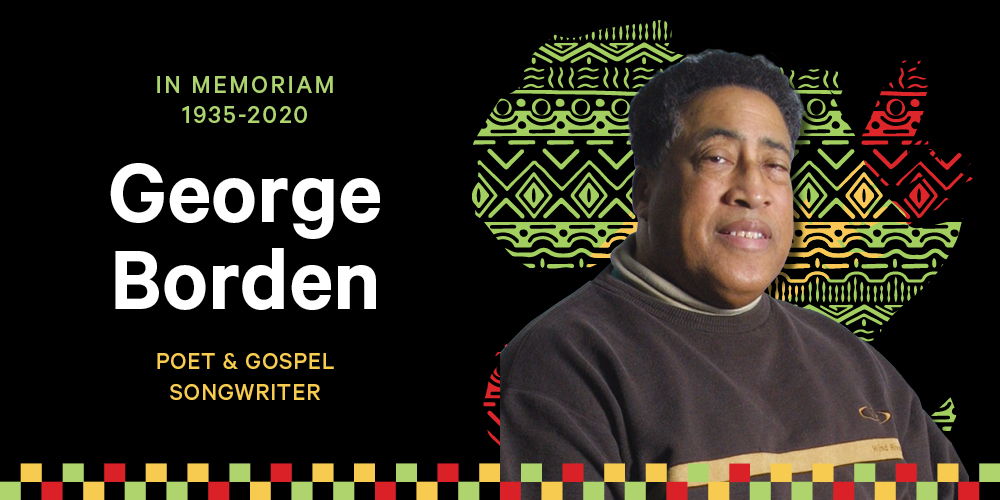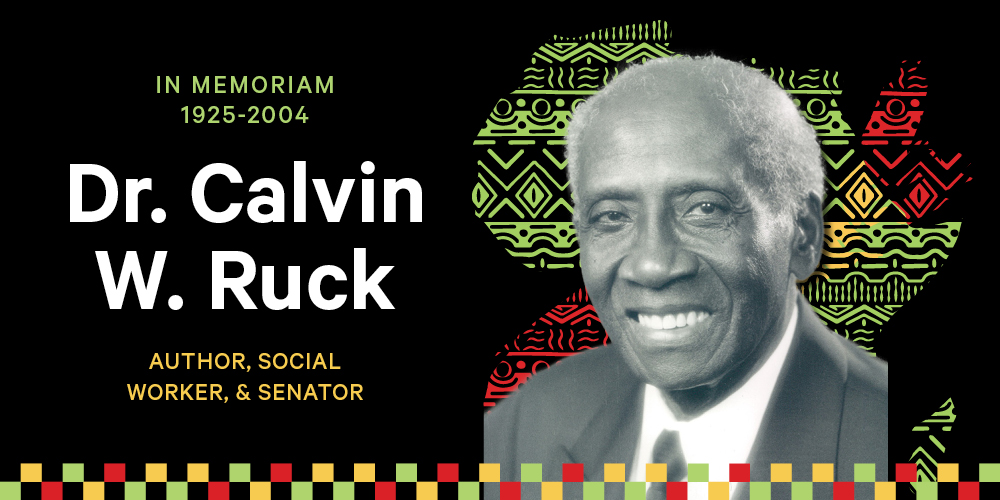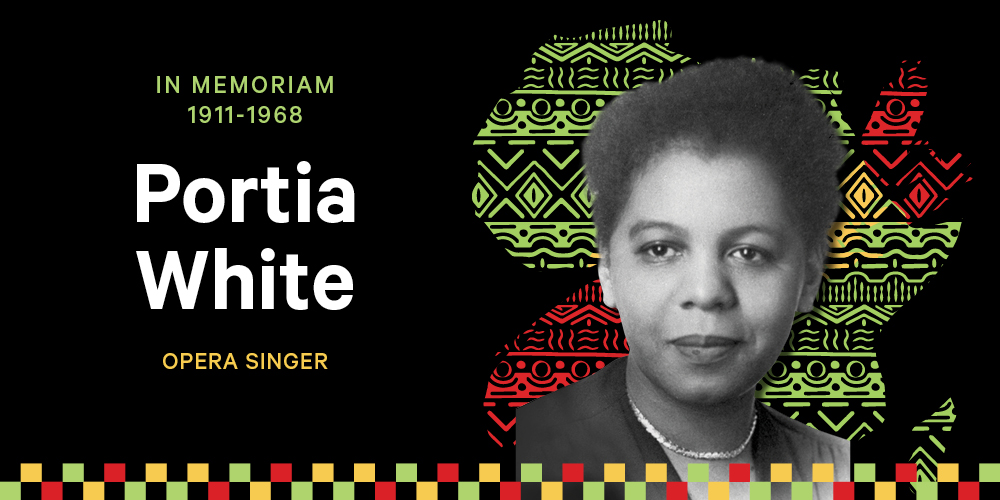
Bookmarking a milestone
This year marks the 40th anniversary of African Heritage Month at Halifax Public Libraries—a collaborative celebration alongside The Black History Month Association to honour the rich history and contributions of African Nova Scotians.
In honour of this milestone, we are thrilled to reissue and reintroduce new limited-edition bookmarks recognizing prominent members of the African Nova Scotian community, both past and present. These bookmarks, which we first introduced in 2004, are more than just placeholders for your favourite reads; they are gateways to the profound stories of those who have shaped our community's history and identity.
As we release more bookmarks throughout 2024, we invite you to visit Halifax Public Libraries to collect these limited-edition pieces of history and to learn more about the remarkable lives of those featured.
Placeholders in history
George Borden: A Life of Words and Service

George Borden was born in New Glasgow, Nova Scotia. He spent 32 years in the Canadian Armed Forces, where he eventually rose to the rank of Captain. He retired from military service in the mid-1980s and, since that time, has been involved with the Black United Front for Nova Scotia and the Black Cultural Centre, where he served on the board of directors. He was a columnist for several local Black newspapers, including the Ebony collection and The Jet. George Borden died on November 29, 2020, at the age of 85.
Works
- A Mighty Long Way (2000)
- Footprints, Images and Reflections (1993)
- Canaan Odyssey (1988)
Awards
- National Black Poetry Competition (1997)
Dr. Calvin W. Ruck: Advocate for Equality and Understanding

Calvin Ruck was born in 1925 in Whitney Pier, Cape Breton. A graduate of the Maritime School of Social Work at Dalhousie University, Ruck devoted his work and life to ending discrimination and racism. In addition to his books, which document the important military contributions of Black Canadians, Ruck was instrumental in having a historic site recognized in Pictou, NS in honor of Canada’s first Black Battalion. Ruck served on the Nova Scotia Human Rights Commission, held many offices in the Black Cultural Society of Nova Scotia, and was one of the earliest members of the Nova Scotia Association for the Advancement of Coloured People. In 1998, Dr. Ruck was appointed to the Senate. Dr. Ruck died at the age of 79 at his home in Ottawa on October 19, 2004.
Works
- The Black Battalion 1916-1920: Canada’s Best Kept Military Secret (1987)
- Canada’s Black Battalion: No 2 Construction 1916-1920 (1986)
Awards
- Honorary degree from University of King’s College (1999)
- Honorary degree from Dalhousie University (1994)
- Harry Jerome Award (1987)
- Freda Vickery Awards (1987)
Portia White: A Voice that Transcended Boundaries

Portia White was born in Truro, Nova Scotia in 1911. Her father was the minister at Cornwallis Street Baptist Church, where she herself was a choir member from the age of six. White earned her teaching degree from Dalhousie University and went on to teach in Lucasville, Nova Scotia. She continued her musical training at the Halifax Conservatory of Music and gave her first recital in June of 1939. In the summer of 1941, Portia made her Toronto debut at the Eaton Auditorium, the first of many appearances in the Toronto area.
In 1944 Edith Read, a principal from Toronto, assisted Portia in getting an audition in New York. This first shot at “The Big Apple” resulted in a sold-out concert at the New York Town Hall. In 1948, she settled in Toronto to teach, and continued to perform infrequently—the most notable performance during that time being a command performance for Queen Elizabeth II at the Confederation Centre in Charlottetown, P.E.I.
White, for all her fame, also had to deal with the racism of the day. As such, she was often refused entry to concert halls and hotels in many Canadian provinces. Portia White died on February 13, 1968, at the age of 56.
Awards
- Person of National Historic Significance - Government of Canada (1995)
- Dr. Helen Creighton Lifetime Achievement Award - posthumously (2007)
George Elliott Clarke: Poet of Heritage and Resistance

George Elliott Clarke is a distinguished Canadian poet, playwright, and literary figure known for his insightful explorations of African-Canadian history and culture. Born on February 12, 1960, in Windsor, Nova Scotia, Clarke’s prolific career has earned him critical acclaim and numerous awards. Holding a Ph.D. in English from Queen’s University, he has lectured at esteemed institutions. Clarke’s works often tackle themes of identity, racism, and social justice, making him a vital voice in contemporary Canadian literature.
Selected Works
- Canticles III: MMXXIII (2023)
- Canticles III (MMXXII) (2022)
- Where Beauty Survived: An Africadian Memoir (2023)
- J’Accuse...! (Poem Versus Silence) (2021)
- Execution Poems (2009)
- Odysseys Home: Mapping African-Canadian Literature (Heritage)
Awards
- George Elliott Clarke Scholarship Fund established at Duke University (2018)
- Fellow of the Royal Canadian Geographical Society (2017)
- Lifetime Achievement Award, Dalhousie University Alumni Association (2017)
- Trailblazers Award—National Black Canadians Summit, Federation of Black Canadians & Michaëlle Jean Foundation (2017)
- Parliamentary [National] Poet Laureate (2016-17)
- Poet Laureate of the City of Toronto (2012-15)
Sylvia Hamilton: Chronicler of Black Canadian Stories

Sylvia D. Hamilton was born in Beechville. She received a BA in English and Sociology from Acadia University and an MA from Dalhousie University. She has received honorary degrees from several universities and has held numerous prestigious teaching positions, including The Nancy’s Chair in Women’s Studies at Mount Saint Vincent University and Inglis Professor at University of King’s College.
Hamilton’s career has included work with CBC, the NFB Women’s Studio, VISION, TVO, BRAVO, and the Knowledge Network. Her documentaries explore the history of Black people in Canada, particularly women. Her efforts to elevate marginalized voices have been recognized with many awards.
Selected Films:
- Black Mother Black Daughter (1989)
- Speak It! From the Heart of Black Nova Scotia (1993)
- Portia White: Think On Me (2000)
- The Little Black School House (2007)
- We are One (2011)
Selected Poetry:
- And I Alone Escaped to Tell You (2014)
- Tender (2022)
Selected Awards:
- Order of Nova Scotia (2023)
- DOC Luminary Award (2021)
- Governor General’s History Award for Popular Media (2019)
- Queen’s Diamond Jubilee Medal (2012)
- Portia White Prize (2003)
- Gemini Award (1994)
- CBC Television Pioneer Award
David Woods: Artistic Voice of Black Nova Scotia

David Woods was born in Trinidad in 1959, and his family moved to Dartmouth, Nova Scotia in the 70s. In 1979, Woods attended Dalhousie University, preparing for a law degree, but when the Black United Front offered him a position educating Black Nova Scotian youths on their historic roots, his plans changed. From this, the Cultural Awareness Youth Group was born, and Woods’ career in activism took flight.
A founding member of the Black History Month Association, the Black Artists Network of Nova Scotia, the Voices Black Theatre Ensemble, the North Preston Cultural Association, the African Nova Scotian Quilters Association, and more, Woods has left his mark on the country as an advocate for Black artists and chronicler of the Black experience.
Selected Works:
- The Secret Codes (2012/2022) (art exhibition)
- In This Place: Black Art in Nova Scotia (1998) (art exhibition)
- The Satchmo Suite: A Teacher’s Study Guide (1997) (study guide)
- Native Song (1990) (poetry)
- I Have a Dream Nova Scotia (1989) (speech)
- The Dream Continues (play)
- Black Journey (play)
- Cain (acrylic painting)
- Catharsis (acrylic painting)
- The Fiddler (acrylic painting)
Awards:
- Harry Jerome Award for Arts and Entertainment by the Black Business and Professional Association 2016
- 2022 Honorary Degree from Dalhousie University
William Hall: Naval Hero of the Victorian Era

William Hall was born in Horton’s Bluff, Nova Scotia, to formerly enslaved parents, who were rescued during the War of 1812 by a British Warship.
As a young man in 1852, Hall went to Liverpool, England and joined the British Royal Navy. He served as an Able Seaman onboard the HMS Rodney and went on to fight in the Crimean War, garnering himself the British and Turkish Crimea awards for his service.
He is most known for being the first Black person, the first Nova Scotian, and the first Canadian sailor to receive the Victoria Cross—the British Empire’s highest honour for acts of bravery. After retiring in 1876, Hall went on to live a quiet life on a farm with his sisters in Avonport, Nova Scotia.
Hall was hardly recognized for his past valour until 1901, when Prince George (later King George V) visited Nova Scotia. A military parade was held in His Royal Highness’ honour, where Hall was in attendance, wearing the Victoria Cross, amongst other medals. The Prince noticed Hall’s medals and inquired about them, bringing attention to his service.
Awards:
- The Victoria Cross
The story continues
Stay tuned as we continue to explore more community history and stories with 12 bookmarks set for release throughout 2024, available at your local branch while supplies last.


Add a comment to: Celebrate 40 Years of African Heritage Month at the Library with Limited Edition Bookmarks